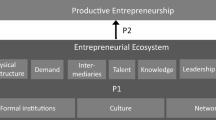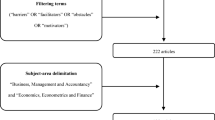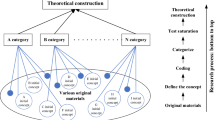Abstract
Start-ups and creative industries have gone through an amazing development since the beginning of the twenty-first century. The location of start-ups and creative industries has been shown to be consistent with the factors of agglomeration externalities and networking of actors. The presence of talented people, as well as an advanced managerial culture, are similarly vital for both sectors. In Slovakia, the government has only recently recognised the potential of start-ups and the creative economy (2013) although the global trend was anticipated by the private and non-profit sectors a couple of years prior to that. Not surprisingly, the first major co-working spaces and young innovative businesses emerged in the capital city Bratislava in 2010. In the east Slovak city of Košice, the first activities only appeared in 2013 within the premises of the Technical University. So far, these young start-up ecosystems have emerged on different foundations. The idea of local and institutional factors of start-up ecosystems has been formulated and evolved into a new theoretical framework. The research on city start-up ecosystems is based on interviews with start-up owners, gurus, venture capitalists, enthusiasts and observers and has resulted in the formulation of the concept of common and inherited ecosystem attributes.



Similar content being viewed by others
References
Asheim, B. T., & Coenen, L. (2005). Knowledge bases and regional innovation systems: comparing Nordic clusters. Research Policy, 34(8), 1173–1190.
Beise, M., & Stahl, H. (1999). Public research and industrial innovations in Germany. Research Policy, 28(4), 397–422.
Birley, S. (1986). The role of networks in the entrepreneurial process. Journal of Business Venturing, 1(1), 107–117.
Blank, S. and Dorf, B. (2012). The start-up owner's manual. K&S; Ranch.
Davidsson, P., & Honig, B. (2003). The role of social and human capital among nascent entrepreneurs. Journal of Business Venturing, 18(3), 301–331.
Dubina, I. N., Campbell, D. F., Carayannis, E. G., Chub, A. A., Grigoroudis, E., & Kozhevina, O. V. (2017). The balanced development of the spatial innovation and entrepreneurial ecosystem based on principles of the systems compromise: a conceptual framework. Journal of the Knowledge Economy, 8(2), 438–455.
Džupka, P., Klasová, S., & Kováč, V. (2016). Analysis of innovative start-up companies–case of Košice region. Quality Innovation Prosperity, 20(1), 40–56.
Feld, B. (2012). Start-up communities: building an entrepreneurial ecosystem in your city. Hoboken: John Wiley & Sons, Inc..
Florida, R. (2002). The rise of the creative class–and how it’s transforming work, leisure, community and every day life. New York: Basic Books.
Florida, R. (2005). Cities and the creative class. New York: Routledge.
Graham, P. (2006). How to be Silicon Valley. http://www.paulgraham.com/siliconvalley. Accessed 20 June 2016.
Gries, T., & Naudé, W. (2009). Entrepreneurship and regional economic growth: towards a general theory of start-ups. Innovation-The European Journal of Social Science Research, 22(3), 309–328.
Halaweh, M., Fidler, C., & McRobb, S. (2008). Integrating the grounded theory method and case study research methodology within is research: A possible 'road map'. ICIS 2008 Proceedings,165.
Huňady, J., Orviská, M., & Pisár, P. (2018). The effect of higher education on entrepreneurial activities and starting up successful businesses. Engineering Economics, 29(2), 226–235.
Isenberg, D. J. (2010). How to start an entrepreneurial revolution. Harvard Business Review, 88(6), 40–50.
Klein, G., & David Vega-Barachowitz, D. (2015). Start-up city: inspiring private and public entrepreneurship, getting projects done, and having fun. Washington: Island Press.
KPMG Slovakia (2014). Start-up Survey 2014. http://www.kpmg.com/SK/sk/IssuesAndInsights/ArticlesPublications/Documents/Start-up-survey-2014-SK.pdf. Accessed 20 Aug 2016.
KPMG Slovakia (2016). Start-up Ecosystem Survey 2016. https://assets.kpmg.com/content/dam/kpmg/pdf/2016/06/start-up-ecosystem-survey-slovakia-2016.pdf. Accessed 1 Sept 2017.
Saxenian, A. (1994). Silicon Valley and route 128: regional prototypes or historic exceptions. Urban Affairs Annual Reviews, 28, 81–105.
Tierney, J. (2014). How to Create a Tech Start-up Scene If You're Not in Silicon Valley. The Atlantic. http://www.theatlantic.com/business/archive/2014/12/how-to-create-a-tech-start-up-scene-if-youre-not-in-silicon-valley/384024. Accessed 16 June 2016.
Velu, C. (2015). Knowledge management capabilities of lead firms in innovation ecosystems. Journal of the Knowledge Economy, 5(3), 123–141.
Wach, K. (2008). Impact of the regional business environment on the development of small and medium-sized enterprises in Southern Poland. Cracow University of Economics Conference Proceedings. 1–13.
Westlund, H., & Bolton, R. (2003). Local social capital and entrepreneurship. Small Business Economics, 21(2), 77–113.
Yining Wu, B. (2013). May. Start-up Communities Crash Course – The Boulder Thesis. http://www.start-upcommunities.ca/2013/05/01/start-up-communities-explained-the-boulder-thesis/. Accessed 15 April 2016.
Funding
The work was supported by the grant of the Slovak Research and Development Agency APVV-14-0512 “Universities and economic development of regions, UNIREG”.
Author information
Authors and Affiliations
Corresponding author
Additional information
Publisher’s Note
Springer Nature remains neutral with regard to jurisdictional claims in published maps and institutional affiliations.
Rights and permissions
About this article
Cite this article
Lavčák, M., Hudec, O. & Sinčáková, Ž. Local and Institutional Factors of Start-Up Ecosystems: Common and Inherited Attributes. J Knowl Econ 10, 1765–1783 (2019). https://doi.org/10.1007/s13132-019-00598-0
Received:
Accepted:
Published:
Issue Date:
DOI: https://doi.org/10.1007/s13132-019-00598-0




